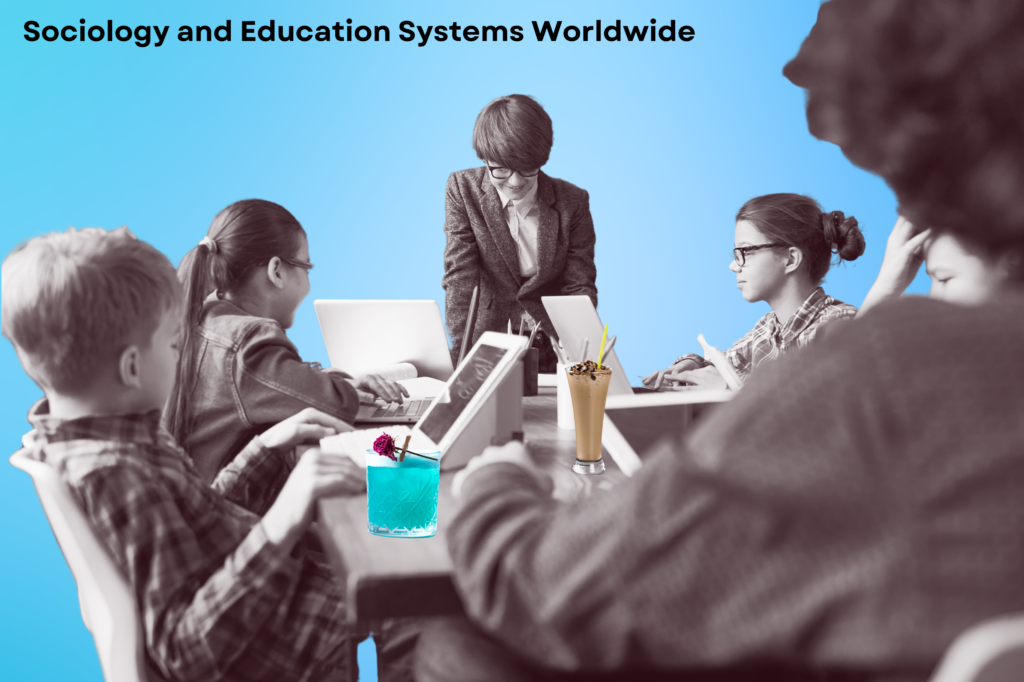Sociology examines groups of people and how they connect. It explores many aspects of people. Sociology’s role in education includes things such as schooling. One of the most essential parts of society is education. It changes people and places for the better. This article will discuss how sociology and education systems worldwide are connected.

The Role of Sociology in Education
Sociology teaches us how schools work in various cultures. It examines how education systems affect what people think, value, and do in society. Sociologists study how schooling affects different groups in society and how it helps keep things in order. This information is essential for making schooling better and more open to everyone.
Education as a Social Institution
Education is one of the most essential parts of society. People must pass on information from one age to the next. All education systems worldwide aim to prepare people for life in society. Through school, people learn crucial life skills and cultural and social norms.
Education Systems in Different Cultures
Different places have different teaching methods. Because each community and group of people has different values, they teach kids in their unique way. In some countries, for instance, school is very formal and organized; in others, it’s easier to change how you learn. Sociologists look at these differences to figure out how the way people are taught represents the values and needs of various societies.
The Impact of Culture on Education
A lot of what makes up school systems is shaped by culture. What is taught and how it is taught is often based on cultural customs and values in many parts of the world. For instance, countries with solid religious practices might put more emphasis on teaching religion, while less religious societies might emphasize teaching science. When they understand this, sociologists can see how education supports or challenges traditional beliefs.
Social Stratification in Education
Society puts people into different groups based on income, schooling, and job. It is called social stratification. Social class is a significant factor in how many people can attend school in many countries. People who come from wealthier homes often have more chances to go to better schools. Since schooling is one of the best ways to get ahead, this can cause social inequality.
Education and Social Mobility
People think that getting an education will help them get ahead in life. In many cultures, a good education is a way to get better jobs and make money. Sociologists study how school systems help or hurt people’s ability to move up in society. Sometimes, education can help reduce social inequality by giving people from bad situations a chance to improve their lives.
Gender and Education
Another critical factor affecting schooling is gender. In some places, boys and girls have different chances to attend school. Sociologists study how gender roles and standards affect the chances of getting an education. Many efforts have been made in the past few years to support gender equality in education, but there are still problems in many parts of the world.
The Role of Government in Education
The government significantly impacts how schools work. It picks who can attend school, what is taught, and how the schools are run. Many places worldwide ensure all kids can attend school by giving them free or cheap lessons. Socs study how government policies affect schooling and what can be done to improve all schools.
The Importance of Public Education
No matter their social or economic background, all kids can attend public school and get an education. Public schools are necessary for promoting equality and social harmony in many countries. However, the level of public schools can be very different between countries and even within the same country. Sociologists study how to improve public schools so all students can benefit.
Private Education and Inequality
On the other hand, private schools generally have better resources and opportunities, but they are usually only for people who can pay for them. This could make it harder for poor and rich kids to get along, which would make things even less fair. Sociologists are interested in how private school systems can widen social gaps.
Education in Developing Countries
There are many problems with education systems in growing countries. These include needing more money, tools, or adequately trained teachers. Many kids in these countries can’t get a good education, which can hurt their chances in the future. Sociologists look into what makes it hard for kids in poor countries to go to school and try to find ways to make it easier for all kids.
The Globalization of Education
Globalization has had a significant effect on schools worldwide. Countries are increasingly copying the policies and methods used in other countries’ schools, which have spread similar teaching methods worldwide. Sociologists study how globalization changes local cultures, customs, and education systems.
Technology and School
The way schooling is given is changing because of technology. Learning online and using digital tools is becoming common in many parts of the world. This can make it easier for more people to attend school, especially in remote or underserved places. However, the fact that not all kids have the same access to technology also brings up issues of fairness. Sociologists study how technology changes schooling and how it can help or hurt equal opportunities.
Changes in society and education
Getting educated can make a big difference in the world. It makes people think deeply, question what is confirmed, and work for a fairer society. Sociologists investigate how education can make society better and less unequal. In many places, education has been a critical part of movements for human rights, equal rights for women, and protection of the environment.
Job Opportunities and Education
How schools work and how jobs are filled are closely connected. People with more education have better job chances and make more money. Sociologists study how schools prepare students for work and how changes in the job market impact schools. In the past few years, teaching skills like critical thinking, problem-solving, and digital literacy that are useful in today’s market have become more necessary.
The Role of Teachers in Education
Teachers are critical to the school system. They are in charge of forming the minds of people who will come after them. Sociologists study what teachers do for a living and how their jobs, training, and motivation affect the level of education. More well-trained teachers are needed in many places, making education less suitable.
Changes in education
Many countries are trying to change their school systems to adapt to a changing world. Reforms to education are often aimed at making it easier for students to get an education, raising standards, and getting students ready for life in the modern market. Sociologists study how changes in education have affected people and the problems that come up when new rules and policies are implemented.
Education and Different Cultures
Society is becoming more diverse, and schools must change to meet kids’ needs worldwide. Multicultural education is a way of teaching that encourages students to understand and value different cultures. Sociologists study how schools can help kids from all backgrounds do well and how they can promote acceptance and respect for all cultures.
Conclusion
To sum up, sociology helps us understand how education systems work and how they can be improved. Education is one of the most critical social institutions because it shapes people and society. By exploring the connection between sociology and education, we can learn more about the problems that schools worldwide face and work to make society more fair and equal.
